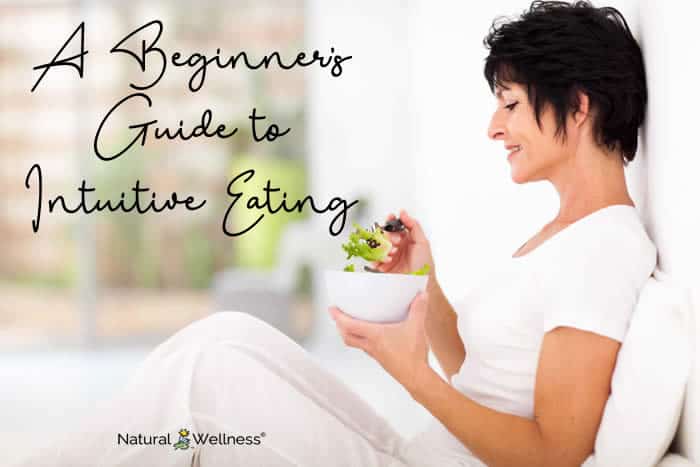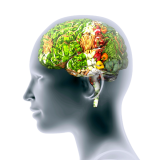

What Is Intuitive Eating?
Intuitive eating is based on the idea that you know what is best for your body. Instead of deciding on a diet that others may have found successful, you decide for yourself what’s best. The essential philosophy of intuitive eating is that you eat when you are hungry and you stop eating when you are full. (2)
When choosing to eat intuitively you will need to retrain your body to know the difference between physical hunger and emotional hunger. (2)
- Physical Hunger – This is the biological urge telling you that your body needs to replenish its nutrients. Building gradually with different signals that include a growling stomach, irritability, and fatigue. Once you eat food, this should be satisfied.
- Emotional Hunger – This hunger isn’t driven by your body needing sustenance but instead driven by emotions. Feeling bored, lonely, or sad can all lead to emotional eating. This can then lead to loathing or self hatred.
You should be learning to only eat when feeling physical hunger while avoiding eating while feeling emotional hunger.
The History of Intuitive Eating
The concept of intuitive eating was first developed in 1995 by Evelyn Tribole and Elyse Resch. Their book was based on a previous concepts and principles that were devised in the 70s and 80s by other researchers. All of these principles come from the core idea that diets don’t work and that it’s more important to make certain lifestyle choices and properly care for yourself. (2)
The 10 Principles of Intuitive Eating
Tribole and Resch’s book has 10 guiding principles that drive intuitive eating. (1)
- Reject the Diet Mentality – Most people believe that there is a diet out there that works for them and that will solve all of their problems. Intuitive eating rejects this idea.
- Honor Your Hunger – If your body is feeling hungry, you should eat, not suppress those feelings. The more you prolong your hunger, the more likely you are to overeat later on.
- Make Peace With Food – Let yourself eat what you like. Don’t feel guilty for what you are eating. If you are telling yourself that certain food is “bad” this can lead to feelings of deprivation, further leading to cravings and eventual overeating.
- Challenge the Food Police – The “food police” are the thoughts inside of your head saying you are “good” if you are eating a salad and less calories or “bad” when you eat pizza or a high calorie snack. Don’t let those thoughts control you.
- Respect Your Fullness – Just like how you should listen to your body when it says you are hungry, you should also listen when you are full. Once you realize you’ve had enough, it’s time to stop eating.
- Discover the Satisfaction Factor – You should actually enjoy your food as you eat it. When you are enjoying your meal, it takes less food to satisfy you.
- Honor Your Feelings Without Using Food – Emotional eating is simply a way for coping with emotions. You should find other ways to cope with emotions instead of eating. Some examples include writing in a journal, exercising, going for a walk, or talking to a friend. These are all healthier options than eating your feelings.
- Respect Your Body – Instead of constantly judging your body for its current shape, you should accept it for what it is and respect how much it is truly capable of.
- Exercise and Feel the Difference – Instead of focusing how exercise can help you lose weight and burn calories, exercise because it makes you feel good. If you enjoy what you are doing it will become easier to do more often.
- Honor Your Health with Gentle Nutrition – You should eat food that makes you feel good, meaning there should be some healthy nutritional value in what you eat. But at the same time, don’t feel guilty for having a snack from time to time.
Does Intuitive Eating Work?
Studies show that intuitive eating has many benefits that include higher self esteem and better body image as well as a better sense of optimism and well-being. It also leads to more satisfaction in life and more proactive coping skills.
Outside of an improved mentality, it also has plenty of physical benefits, including:
- lower body mass index
- higher HDL cholesterol levels
- and lower triglyceride levels.
Intuitive eating also shows lower rates of both emotional and disordered eating. (3)
What’s the Difference Between Intuitive and Mindful Eating?
Mindful eating is defined as “allowing yourself to become aware of the positive and nurturing opportunities that are available through food selection and preparation by respecting your own inner wisdom” and “using all your senses in choosing to eat food that is both satisfying to you and nourishing to your body, and becoming aware of physical hunger and satiety cues to guide your decisions to begin and end eating.”
This is different from intuitive eating, as intuitive eating goes on to reject the diet mentality and also respecting your body, no matter what shape it’s in. Intuitive eating also involves coping with emotional eating, nutrition without judgment, and gentle nutrition. Both of these concepts can help you find the best eating practices that work for you. (3)
6 Intuitive Eating Tips
If you are considering intuitive eating, here are some tips for getting started.
- Start taking note of your eating habits and attitudes.
- Are you eating out of physical or emotional hunger?
- Don’t judge yourself for these habits, just start to understand them.
- If eating due to physical hunger, on a scale from 1-10, rate your hunger and fullness levels on a basis from starving to very full.
- You should try to eat when you are hungry but not starving yet.
- Once you are comfortably full, stop eating; don’t keep going till you are stuffed. (2)




